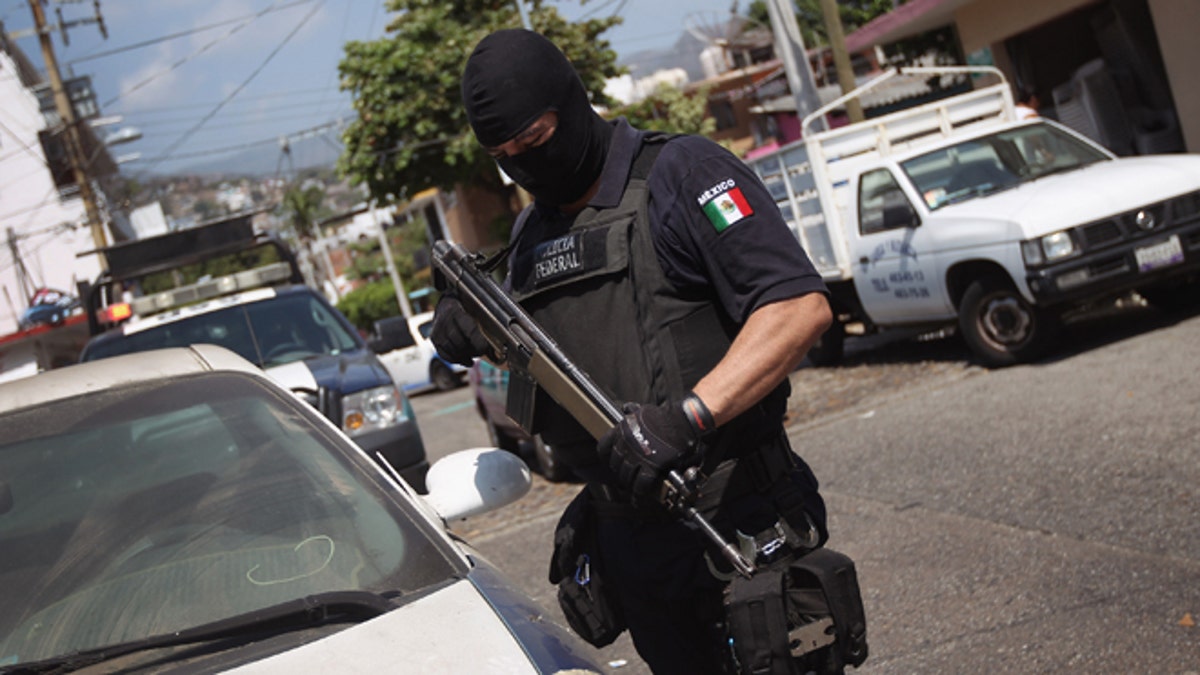
ACAPULCO, MEXICO - MARCH 01: A Mexican federal policeman inspects an abandoned car on March 1, 2012 in Acapulco, Mexico. Stolen vehicles used by drug gangs are often found abandoned throughout the city. Drug violence surged in the coastal resort last year, making Acapulco the second most deadly city in Mexico after Juarez. One of Mexico's top tourist destinations, Acapulco has suffered a drop in business, especially from foreign tourists, due to reports of the violence. Toursim accounts for some 9 percent of Mexico's economy and about 70 percent of the output of Acapulco's state of Guerrero. (Photo by John Moore/Getty Images) (2012 Getty Images)
GUADALAJARA, Mexico (AP) – At least seven people died as flames and gunfire erupted around the western Mexico state of Jalisco on Friday when a military operation targeting a violent drug cartel was launched at the start of a three-day holiday weekend.
Suspected cartel members stopped buses and trucks to block key highways in the state capital of Guadalajara and other cities, snarling traffic on a day Mexicans took to the road in droves. Officials said 11 banks and five gas stations were firebombed in almost simultaneous attacks. Lesser violence also was reported in three neighboring states.
The first attack occurred when gunmen fired on a military helicopter, killing three soldiers and forcing it to make an emergency landing about 150 miles (250 kilometers) southwest of Guadalajara. Ten soldiers and two federal police officers were injured and three soldiers remained missing, a defense ministry statement said.
The statement said the helicopter was participating in the anti-cartel offensive known as Operation Jalisco.
Jalisco Gov. Aristoteles Sandoval said at an afternoon news conference that the violence around the state was a reaction to the operation, which he said was designed to "get to the bottom of and to be able to arrest all the leaders of this cartel, of this organization."
Sandoval did not name the cartel, but authorities have been locked in an increasingly bloody battle with the Jalisco New Generation cartel. Last month, cartel gunmen killed 15 state police officers in an ambush that was the bloodiest single attack on Mexican authorities in recent memory.
One week earlier, cartel gunmen attempted to assassinate the state security commissioner and on March 19 they killed five federal police officers. Authorities have said those attacks were revenge for state forces killing a cartel leader.
On Friday, Sandoval said Operation Jalisco, which had been announced by federal authorities earlier in the day, had the goal of arresting all members of the cartel.
Sandoval said there were a total of seven deaths Friday, but did not specify the circumstances or the victims.
Later, state spokesman Gonzalo Sánchez said through his Twitter account that the dead included three soldiers, one state police officer, two suspected criminals and one civilian. In an interview with the newspaper El Universal, Sanchez said authorities believed the Jalisco New Generation cartel was responsible.
Sandoval counted 39 road blockades around the state affecting 25 municipalities. Nineteen people were arrested and there were four armed confrontations, he said. He said 19 people were injured, including three civilians who suffered burns.
Alejandro Hope, a former official with Mexico's intelligence service, said the violent response to the government offensive showed the cartel is cohesive and capable of reacting to attacks. He said the gang would likely tighten security to fend off the capture of its leader, who is believed to be Nemesio Oseguera Cervantes, nicknamed "El Mencho."
Hope questioned the decision to go after the cartel's top leadership before first taking out mid-level leaders and weakening the gang's ability to react with coordinated violence.
However, Jorge Chabat, another Mexican security expert, said he didn't think the cartel's response would have a big impact. "I don't believe that it is going to make the federal government leave them alone," he said.
President Enrique Peña Nieto said Friday through his Twitter account that he lamented the soldiers' deaths in the course of their work in Jalisco.
In December, Peña Nieto said Jalisco was considered one of the most unstable states in terms of security, along with Tamaulipas, Guerrero and Michoacán. He said then that those states would be prioritized in anti-crime efforts, but the violence there has continued.
The U.S. consulate in Guadalajara issued an advisory warning U.S. citizens to avoid travelling in the area.
Earlier, the Jalisco state prosecutor's office used its Twitter account to urge people in Guadalajara to remain calm as authorities responded to the road blockades. It said officials also were coordinating to extinguish fires and regain calm in other parts of the state's interior.
Such blockades are a common cartel response to the arrest of important members or are used to foil police and military operations. In recent weeks, burning vehicles and blockades in the state of Tamaulipas along the Texas border were attributed to factions of the Gulf cartel following the capture of some local leaders.
But there have not been so many blockades erected simultaneously across so many parts of a state in recent memory.
